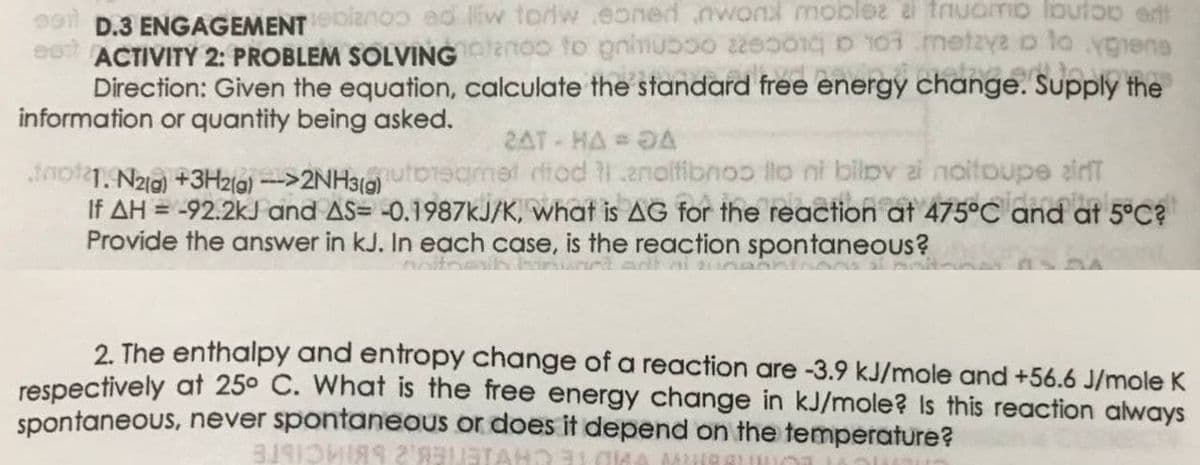o1. N2a) +3H2(a) ->2NH319) utoegmet diod .anolfibnoo llo ni bilov ai noitoupe airfT If AH = -92.2kJ and AS= -0.1987KJ/K, what is AG for the reaction at 475°C and at 5°C? Provide the answer in kJ. In each case, is the reaction spontaneous?
o1. N2a) +3H2(a) ->2NH319) utoegmet diod .anolfibnoo llo ni bilov ai noitoupe airfT If AH = -92.2kJ and AS= -0.1987KJ/K, what is AG for the reaction at 475°C and at 5°C? Provide the answer in kJ. In each case, is the reaction spontaneous?
Chemistry for Engineering Students
4th Edition
ISBN:9781337398909
Author:Lawrence S. Brown, Tom Holme
Publisher:Lawrence S. Brown, Tom Holme
Chapter10: Entropy And The Second Law Of Thermodynamics
Section: Chapter Questions
Problem 10.102PAE: 10.102 Ammonia can react with oxygen gas to form nitrogen dioxide and water. (a) Write a balanced...
Related questions
Question

Transcribed Image Text:9ol D.3 ENGAGEMENToiano d liw todw eoned nwond moblez ai truomo loutoo ent
eest ACTIVITY 2: PROBLEM SOLVINGenoo to gninuboo a20 metzya o lo Ygiene
Direction: Given the equation, calculate the standard free energy change. Supply the
information or quantity being asked.
2AT HA = OA
no1. Nza) +3H2(0) ->2NH319) uto1egmat dtod .ernolfibnoo llo ni bilov ai noitoupe airit
475°C
If AH = -92.2kJ and AS= -0.1987KJ/K, what is AG for the reaction at
draat 5°C?
Provide the answer in kJ. In each case, is the reaction spontaneous?
2. The enthalpy and entropy change of a reaction are -3.9 kJ/mole and +56.6 J/mole K
respectively at 25° C. What is the free energy change in kJ/mole? Is this reaction always
spontaneous, never spontaneous or does it depend on the temperature?
Expert Solution
This question has been solved!
Explore an expertly crafted, step-by-step solution for a thorough understanding of key concepts.
Step by step
Solved in 4 steps

Knowledge Booster
Learn more about
Need a deep-dive on the concept behind this application? Look no further. Learn more about this topic, chemistry and related others by exploring similar questions and additional content below.Recommended textbooks for you

Chemistry for Engineering Students
Chemistry
ISBN:
9781337398909
Author:
Lawrence S. Brown, Tom Holme
Publisher:
Cengage Learning

Chemistry & Chemical Reactivity
Chemistry
ISBN:
9781133949640
Author:
John C. Kotz, Paul M. Treichel, John Townsend, David Treichel
Publisher:
Cengage Learning

Chemistry & Chemical Reactivity
Chemistry
ISBN:
9781337399074
Author:
John C. Kotz, Paul M. Treichel, John Townsend, David Treichel
Publisher:
Cengage Learning

Chemistry for Engineering Students
Chemistry
ISBN:
9781337398909
Author:
Lawrence S. Brown, Tom Holme
Publisher:
Cengage Learning

Chemistry & Chemical Reactivity
Chemistry
ISBN:
9781133949640
Author:
John C. Kotz, Paul M. Treichel, John Townsend, David Treichel
Publisher:
Cengage Learning

Chemistry & Chemical Reactivity
Chemistry
ISBN:
9781337399074
Author:
John C. Kotz, Paul M. Treichel, John Townsend, David Treichel
Publisher:
Cengage Learning

General Chemistry - Standalone book (MindTap Cour…
Chemistry
ISBN:
9781305580343
Author:
Steven D. Gammon, Ebbing, Darrell Ebbing, Steven D., Darrell; Gammon, Darrell Ebbing; Steven D. Gammon, Darrell D.; Gammon, Ebbing; Steven D. Gammon; Darrell
Publisher:
Cengage Learning

Chemistry: The Molecular Science
Chemistry
ISBN:
9781285199047
Author:
John W. Moore, Conrad L. Stanitski
Publisher:
Cengage Learning

Chemistry: Principles and Reactions
Chemistry
ISBN:
9781305079373
Author:
William L. Masterton, Cecile N. Hurley
Publisher:
Cengage Learning